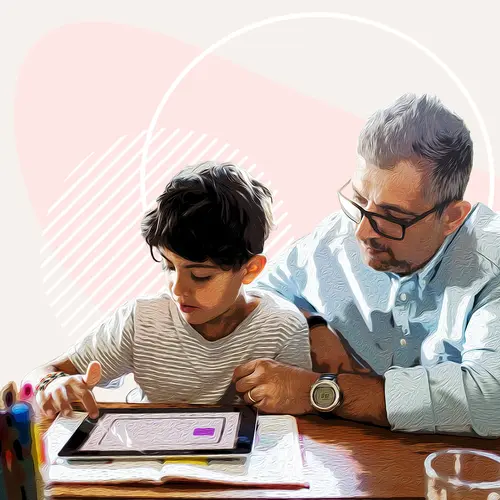If your child’s behavior has you wondering if it’s a normal part of growing up or something else, it may be time to turn to an expert. When it comes to ADHD, teachers often are the first to notice possible symptoms.
But teachers can’t diagnose ADHD. If you suspect that your child might have it, start with a visit to their pediatrician. It’s especially helpful to see a doctor who has special training to diagnose and treat ADHD and learning disabilities. Or you might be referred to a mental health professional, like a psychiatrist or psychologist.
How to Get Ready for the Appointment
Gather some key information to help your pediatrician or specialist make a diagnosis.
Make lists of any:
- Symptoms or troubles that your child has at home and school
- Recent life changes or big, stressful events they’ve gone through
- Other health conditions
- Medications, vitamins, herbs, or other supplements they take. Note the dose and how often they take it.
Round up your child’s recent school report cards and the results of any formal tests or evaluations that you’ve had them take, too.
Make a list of questions for the pediatrician or mental health specialist. For instance, you could ask what psychological tests your child might need, and whether something other than ADHD might be causing their symptoms.
You can expect the doctor or specialist to ask you questions, too. They’ll want to know things like:
- When did your child start having symptoms?
- Do they have behavior issues in certain situations or all of the time?
- How severe are these issues at home and at school?
- How does your child’s behavior affect them and the rest of your family?
- Have any other close relatives been diagnosed with ADHD? The condition can run in families.
The doctor or specialist may also ask you about your child’s daily routine, grades at school, sleeping habits, and more. They may have you fill in a checklist or a rating scale about your child's behavior.
What to Expect in an ADHD Evaluation
Your pediatrician or specialist will need to put together information that they get from you, your child's school, and your child's medical records. This information will help rule out other possible causes of their behavior.
The pediatrician or specialist should learn as much as possible about your child's behavior. They will talk with you, your child, their teachers, and possibly with other adults who are part of your little one’s life, like tutors or coaches.
They should also ask you and your child's teachers to fill out standardized evaluation forms. If possible, they may also observe your child in their classroom.
They may recommend an evaluation that checks on your little one’s education and classroom needs, too. This is called a psychoeducational evaluation. It’s used to diagnose ADHD and learning disabilities like dyslexia.
It includes:
- IQ testing
- Achievement testing
- Measures of their attention, memory, and more
The pediatrician or specialist might also suggest doing a brain scan that can help diagnose childhood ADHD. It’s called the NEBA System, and it’s FDA-approved for children 6 to 17 years old. It’s meant to be just one part of a complete medical and psychological exam.
The scan measures theta and beta brain waves. Some research shows that kids and teens with ADHD have a higher ratio of theta-to-beta waves than children without the disorder.
If the evaluation process leads to an ADHD diagnosis, your pediatrician or specialist should tell you the specific type of ADHD your child has. They should also help you build a treatment plan to take charge of the symptoms.
In most cases, an ADHD treatment plan will involve both ADHD medication and behavioral therapy.
Medication can ease ADHD symptoms. Therapy can help your child practice good habits. For instance, therapists can help parents create a program of rewards for good behavior and consequences for bad behavior. Or they can set up a system to help an inattentive child get organized.
Have your child’s doctor or ADHD specialist explain what treatments might help and which ones they’d recommend. If they suggest medication, ask what the possible side effects are. You can also ask if there’s a less-expensive generic version of the drug.
Sometimes your child’s school can help with accommodations to your child’s learning and testing environment. If you choose treatment with ADHD medication you will need a prescription and follow-up from a medical doctor (such as your pediatrician, a pediatric psychiatrist, or a neurologist).
Some children diagnosed with ADHD may also be experiencing depression or anxiety. In such cases, therapy is often recommended as part of the treatment plan.
What You Can Do Now
If you’re thinking about having your child evaluated for ADHD or you’re waiting for an appointment to get the process started, you can do several things to help your little one right away:
- Set up a schedule. Your child should have the same routine every day, with time for homework and play included. Post this schedule somewhere they can easily see it at home.
- Be clear about expectations. Make sure your child knows what you expect. Be consistent with consequences if they don’t meet those expectations. At the same time, be quick to reward them when they follow your rules.
- Praise your child for good behavior, rather than nagging and criticizing them.
- Help them organize everyday items. Work with them on finding a place for everything. This includes clothing, backpacks, and school supplies.
- Jog your child's memory. The same system you use to remember tasks or appointments -- a watch alarm, lists, sticky notes, or a calendar -- may work for your child. Find a system that helps them remember appointments, chores, school assignments, and so on.
- Set a good example. When you're with your child, manage your own emotions the way you want them to control theirs.

